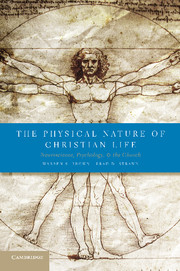Book contents
- Frontmatter
- Contents
- Acknowledgments
- 1 Bodies or Souls?
- Part I Human Nature as Physical
- Part II The Formation of Persons: Retrospect and Prospect
- Part III Emodied Christian Life and The Church: Retrospect and Prospect
- 7 Why Bodies Need Churches
- 8 Church Bodies
- 9 The Embodied Church
- 10 Concluding Thoughts
- Selected Resources
- Index
- References
10 - Concluding Thoughts
The Church After Dualism
Published online by Cambridge University Press: 05 July 2012
- Frontmatter
- Contents
- Acknowledgments
- 1 Bodies or Souls?
- Part I Human Nature as Physical
- Part II The Formation of Persons: Retrospect and Prospect
- Part III Emodied Christian Life and The Church: Retrospect and Prospect
- 7 Why Bodies Need Churches
- 8 Church Bodies
- 9 The Embodied Church
- 10 Concluding Thoughts
- Selected Resources
- Index
- References
Summary
EMBODIED FOREGIVENESS
A few days later, when Jesus again entered Capernaum, the people heard that he had come home. They gathered in such large numbers that there was no room left, not even outside the door, and he preached the word to them. Some men came, bringing to him a paralyzed man, carried by four of them. Since they could not get him to Jesus because of the crowd, they made an opening in the roof above Jesus by digging through it and then lowered the mat the man was lying on. When Jesus saw their faith, he said to the paralyzed man, “Son, your sins are forgiven.”
Now some teachers of the law were sitting there, thinking to themselves, “Why does this fellow talk like that? He’s blaspheming? Who can forgive sins but God alone?”
Immediately Jesus knew in his spirit that this was what they were thinking in their hearts, and he said to them, “Why are you thinking these things? Which is easier: to say to this paralyzed man, ‘Your sins are forgiven,’ or to say, ‘Get up, take your mat and walk’? But I want you to know that the Son of Man has authority on earth to forgive sins.” So he said to the man, “I tell you, get up, take your mat and go home.” He got up, took his mat and walked out in full view of them all. This amazed everyone and they praised God, saying, “We have never seen anything like this?”
[Mark 2:1–12, NIV]This book has been about bodies – human bodies and church bodies. Our premise has been that viewing persons as bodies, not souls inhabiting bodies, is truer to scripture, as well as more resonant with modern neuroscience and psychology. Most Christians believe that humans are souls that have bodies, not that we are bodies. They presume that the “real me” is not their body or even their behavior, but is something inside them, in their head or heart – in their mind or soul. Thus, it is possible to be spiritual inside, without being religious in what we do – without participating in the communal religious life of the church.
- Type
- Chapter
- Information
- The Physical Nature of Christian LifeNeuroscience, Psychology, and the Church, pp. 158 - 168Publisher: Cambridge University PressPrint publication year: 2012



